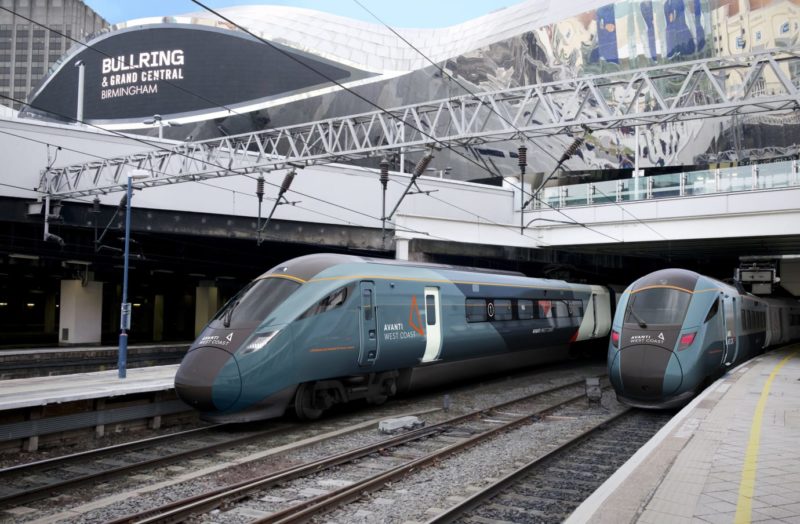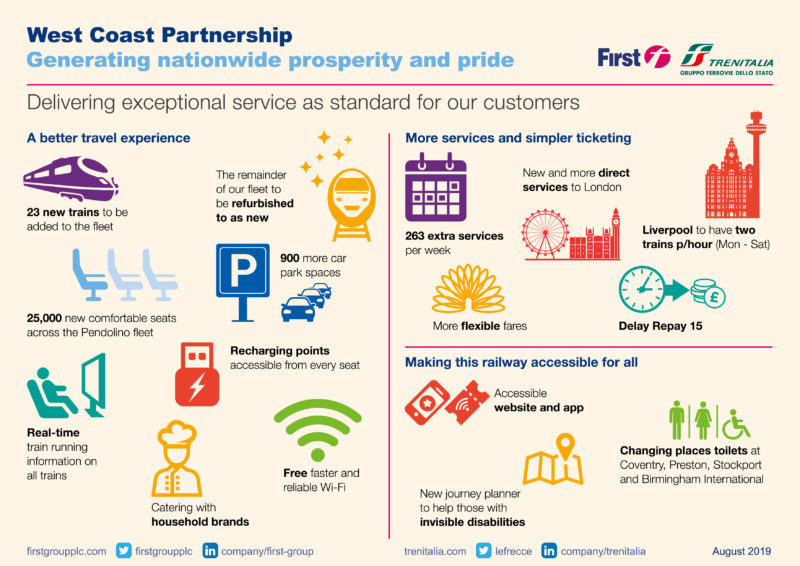It seems the Hitachi order book continues to fill up with Avanti West Coast (the new franchise holder of the West Coast Main Line route) ordering new trains from them
The order covers 23 new trains – or 135 carriages if you work to that metric.

Avanti West Coast new Hitachi trains – Image, Hitachi Rail
It covers 10 seven-carriage units and 13 five-carriage bi-modal units. The electric trains will operate between London, the West Midlands and Liverpool, whilst the bi-mode version will serve the London to North Wales route.
In terms of seating, the electric trains will have 453 seats on a 7-car service and 301 seats on a 5-car bi-mode service.
These trains will both expand the Avanti West Coast fleet and at the same time – replace the Voyagers trains.
The trains fall into the design family that resembles the InterCity Express Project/InterCity Express Train that has been chosen by many operators including Great Western Railway, LNER, East Midlands Railway, TransPennie Express, Hull Trains (currently in service) as well as East Midlands Railway and East Coast trains (the planned FirstGroup budget service).
In terms of passenger experience, they are promising a quieter journey (compared to the diesel-only trains), offering free Wi-Fi, Inductive wireless device charging, plug sockets, USB sockets and real-time passenger information system.
Catering on these trains has described as “a brand-new catering offer” – make of that what you will.
In quotes
Steve Montgomery, Managing Director, First Rail, said:
“We look forward to beginning our Avanti West Coast services on Sunday 8 December, and these new trains will help us really improve travel for passengers with more services, more seats, a better journey experience, enhanced catering and added comfort.”
Ernesto Sicilia, Trenitalia UK Managing Director, said:
“We are pleased to announce this new fleet which highlights our commitment to innovation and desire to constantly improve our services. We are delighted to provide more efficient and modern trains which are sustainable and environmentally friendly, reducing CO2 emissions by 61%, including new comfortable seats for an improved customer experience.”
Andrew Barr, Group CEO, Hitachi Rail, said: “
“Based on Japanese bullet train technology, our new trains have proven to be the modern intercity train of choice, increasing passenger satisfaction wherever they run. We’re delighted to continue our excellent relationship with FirstGroup and Trenitalia, for whom we’ve delivered hundreds of trains across Italy and the UK. This new order, which will be built at our factory in the North East, is another vote of confidence in the success of our trains, which are both green and reliable.”
Putting the pieces together
With the plans that Avanti West Coast want to execute with its expansion and route changes, the additional trains will no doubt be welcome by short to medium distance passengers.
As for jettisoning the Voyagers? Whilst a lot of people won’t be sad seeing those trains go (along with those wonderfully… “fragrant” toilets – and that’s the polite term), they suffered from a major problem from day one: not being long enough or having the capacity for a growing train carrying public (especially when they were deployed on the CrossCountry network – a problem it suffers today).
I’ve done my fair share of Voyager trips (both to London and to the South Coast) and whilst they’re not brilliant trains, they got you from A to B in some comfort.
If the new trains can meet a benchmark of getting people from A to B in improved comfort, whilst offering a better passenger experience, it will be a welcome thing to see.
Welcome to Economy Class and Beyond – Your no-nonsense guide to network news, honest reviews, with in-depth coverage, unique research as well as the humour and madness as I only know how to deliver.
Follow me on Twitter at @EconomyBeyond for the latest updates! You can also follow me on Instagram too!
Also remember that as well as being part of BoardingArea, we’re also part of BoardingArea.eu, delivering frequent flyer news, miles and points to the European reader.
